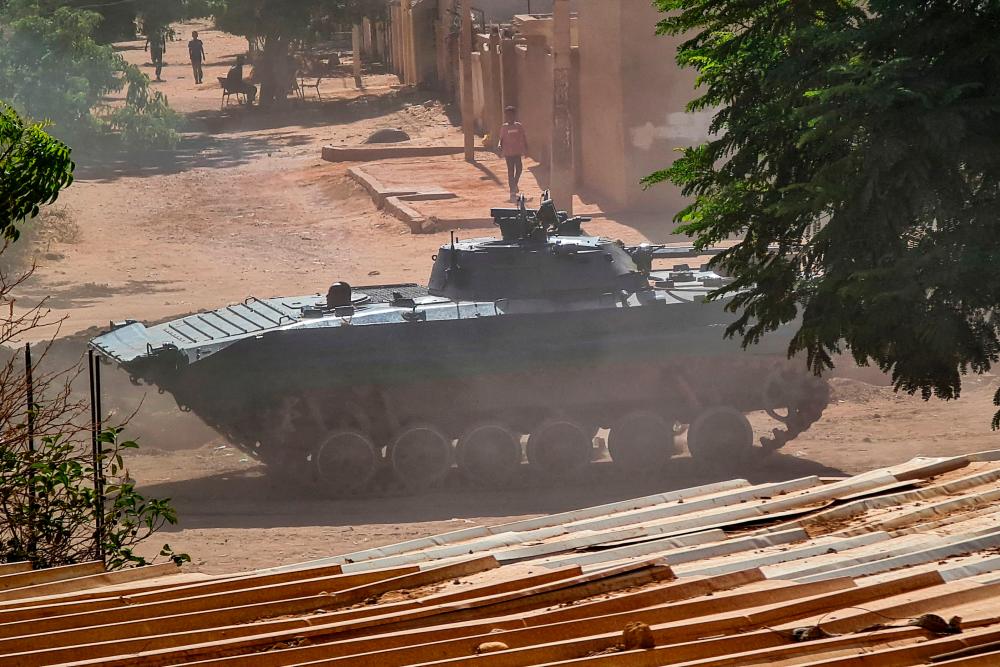KHARTOUM: Explosions again shook Sudan's capital on Tuesday, dimming hopes that a US and Saudi-brokered humanitarian ceasefire will take hold on the ground after more than five weeks of fighting.
The latest, one-week truce formally entered into force late Monday, but it was quickly violated, like a series of previous such agreements since the war between two rival generals erupted on April 15.
“We can hear the sound of artillery fire,“ a Khartoum witness told AFP on Tuesday. “Every few minutes, there’s a blast.”
Residents had also reported combat in northern Khartoum and air strikes in the east of the capital shortly after the deadline at 9:45 pm (1945 GMT) Monday.
In some parts of Khartoum an uneasy silence held Tuesday as residents desperately hoped for a pause in combat to allow in life-saving humanitarian aid, or to enable more people to flee the embattled city of five million.
The fighting has pitted the army, led by Sudan's de facto leader Abdel Fattah al-Burhan, against the paramilitary Rapid Support Forces commanded by his former deputy Mohamed Hamdan Daglo.
The battles have left about 1,000 people dead, forced more than a million to flee their homes and sparked mass evacuations of foreigners and major refugee flows into neighbouring counties.
People have run low on water, food and basic supplies, and the war has left more than half the population, 25 million people, in need of humanitarian aid, according to the UN.
‘Broken promises'
A foreign aid group voiced frustration with the fighting that has piled new misery on the already poverty-stricken northeast African nation.
“Beyond official announcements, Sudan is still pounded and bombarded, with millions of civilian lives at risk,“ Karl Schembri of the Norwegian Refugee Council wrote on Twitter.
“We’ve had over a month of broken promises and empty words while humanitarian colleagues were killed, together with children and others and hospitals destroyed.”
Volker Perthes, the United Nations envoy to Sudan, told the UN Security Council on Monday that “fighting and troop movements have continued even today, despite a commitment by both sides not to pursue military advantage before the ceasefire takes effect”.
While no previous truce has held, the United States and Saudi Arabia, which brokered the deal, said this agreement was different because it was “signed by the parties” and would be supported by a “ceasefire monitoring mechanism”.
According to the text released by the United States, warring sides were to use the two days before it took effect to “inform their respective forces” about it and “instruct them to comply”.
Neither side has yet blamed the other for violating the truce, as they did within minutes after the previous ceasefires unravelled.
'Victory or martyrdom'
Hours before the truce was to start, Daglo released a voice message on social media in which he told his fighters: “It is either victory or martyrdom, and victory will be ours.”
Addressing reported violations by his forces -- including rampant looting, targeting of civilians and attacks on churches -- he blamed “coup plotters” in the army.
Major fighting has rocked the western Darfur region near Chad, where the UN has reported hundreds of civilians killed in the West Darfur capital El Geneina.
Perthes in his Security Council address warned that “the conflict risks to expand and prolong ... with implications for the region.”
“In parts of the country, fighting between the two armies or the two armed formations has sharpened into communal tensions, or triggered conflict between communities,“ he said, after reports of civilians being armed in Darfur.
Sudan has a long history of military coups and the army in 2019 overthrew the veteran Islamist autocrat Omar al-Bashir after mass protests against his rule.
Sudanese were promised a gradual transition toward civilian rule, but Burhan and Daglo staged another coup in October 2021 before simmering tensions between the two men flared into the current round of bloody fighting. - AFP









